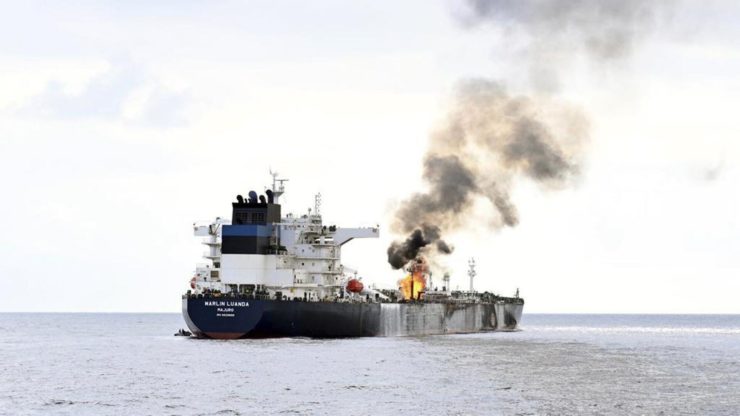
The Red Sea holds immense significance in international maritime trade. Two choke points, the Suez Canal and the Bab al-Mandab, hold critical value in this sea route. Around 22 percent of global maritime container trade passed through the Suez Canal in 2023. Bab-el-Mandeb strait is used to access this Canal by ships traveling from Europe. The Red Sea hosts almost 12 percent of global trade, 21344 vessels per day, amounting to $1 trillion in goods, and 10 percent of maritime trade. A colossal amount of oil shipments from the Persian Gulf to North America and Europe pass through this region. Since the outbreak of the Israel-Hamas war, the Houthis have been targeting ships bound for Israel to pressure it to stop the genocide of the people of Palestine. However, these attacks have global ramifications. Houthi attacks on ships in the Red Sea have forced the container ships to reroute around the Cape of Good Hope. This has added about 3000-3500 nautical miles journeys, along with adding 10 days to the duration of the trip.
Attacks by Houthis on ships in the Red Sea have multiple ramifications on world trade, ranging from threatening regional security and disrupting maritime operations to inflicting environmental damage. The group holds significant experience and expertise in fighting guerilla wars. Houthis, allegedly backed by Iran, hold control over 1/3rd of the country, where 70 percent of the country’s population resides. They have been at war with the Saudi army at the Saudi-Yemen border and with the Saudi-led coalition, which is internationally recognized as the sole legitimate government, inside the country. According to the United Nations, more than 377000 people have been killed in this decade-old war between Saudi Arabia and Houthis. The world merely focused on the humanitarian crisis emanating from the conflict between the Houthis and Saudi Arabia. Houthis have also used the rising cordiality between Israel and Saudi Arabia to further their narrative among the people of Yemen. They hold that they are fighting Israel and the United States for control over Yemen.
Israel’s recent genocidal war in Gaza has bolstered its narrative among the Arab and Muslim populations. The Houthis started attacking the Israel-bound ships on 19th November, 2023 in solidarity with the Palestinian people. These attacks gained mass approval not merely by the native Yemeni people but by the Arab and Muslim populations around the world. Pro-Palestine people around the world saw these attacks as a sign of courage and resilience against the tyranny of the West-backed Israeli government. Houthis are propagating ripples in the international maritime trade by disrupting the Red Sea trade route.
On the other hand, the West seemed perplexed over these attacks. The United Nations Security Council passed a resolution in January 2024 asking the Houthis for immediate cessation of attacks on the cargo ships. Moreover, the United States formed a maritime coalition against the group to secure their ships in the Red Sea. The coalition forces launched Operation Prosperity Guardian against the Yemeni Houthis in that very month. However, these attacks by the US-led coalition did not succeed in preventing the Houthis from attacking ships in the Red Sea despite its military supremacy against the group. Houthis announced in March 2024 that all the vessels entering Yemeni waters will have to seek a permit from the Houthi Maritime Affairs Authority in March 2024. This demonstrates the inefficacy and failure of the retaliatory attacks of the coalition army.
Houthis seek to achieve multiple goals through these attacks. Although pressurizing Israel and their Western allies is the key rationale behind their attacks, they also want to gain political leverage against their domestic rival the STC (Southern Transition Council), bolster pressure on Saudi-backed groups inside their country, and accumulate popularity and acceptance among the Arab people. However, these attacks have impacted trade costs for the ships passing through the Red Sea. According to the Kiel Institute for the World Economy, the freight container volumes in the Red Sea have decreased by 78 percent from the expected values. Many shipping companies including Maersk, Hapag-Lloyd, France’s CMA CGM and Italian-Swiss giant Mediterranean Shipping Company (MSC) have halted their operations in the Red Sea due to the Houthi attacks. Insurance premiums have also increased to a significant level.
Furthermore, the shipping companies have to pay around 250 percent more to the insurance companies. Additionally, the ships traveling through the Red Sea will now have to arrange for “bunkering, husbandry, crew changes, and any customs or port fees at new ports of call” according to the Inchcape Shipping Services. A total of 586 vessels were rerouted only in February 2024, which resulted in the decrease in container tonnage passing through the Red Sea falling by 82 percent. The cost of this redirecting is estimated to be around $1 million in fuel for each trip between Asia and Europe. Along with increased travel costs to avoid the Red Sea, the shipping companies opting for passing around the Cape of Good Hope are also struggling with ship shortages and congested ports.
Consequently, the confrontation between Houthis and Israel, along with its allies, in the Red Sea has global ramifications. This confrontation can cause significant disruption and delays in the flow of goods, which renders negative impacts on global supply chains. Therefore, this conflict holds the potential to increase inflation and cause regional instability, along with impinging maritime trade. International organizations and all the key stakeholders in the Israel-Hamas war, especially the United States and its allies, need to take pragmatic steps to resolve the issue instead of just putting an ounce of all the Red Sea crisis on the Houthis. If Israel continues the genocide in Gaza, the predicament in the Red Sea might further exacerbate, causing inflation and supply chain disruption around the world.
Taut Bataut – is a researcher and writer that publishes on South Asian geopolitics, exclusively for the online magazine “New Eastern Outlook”.